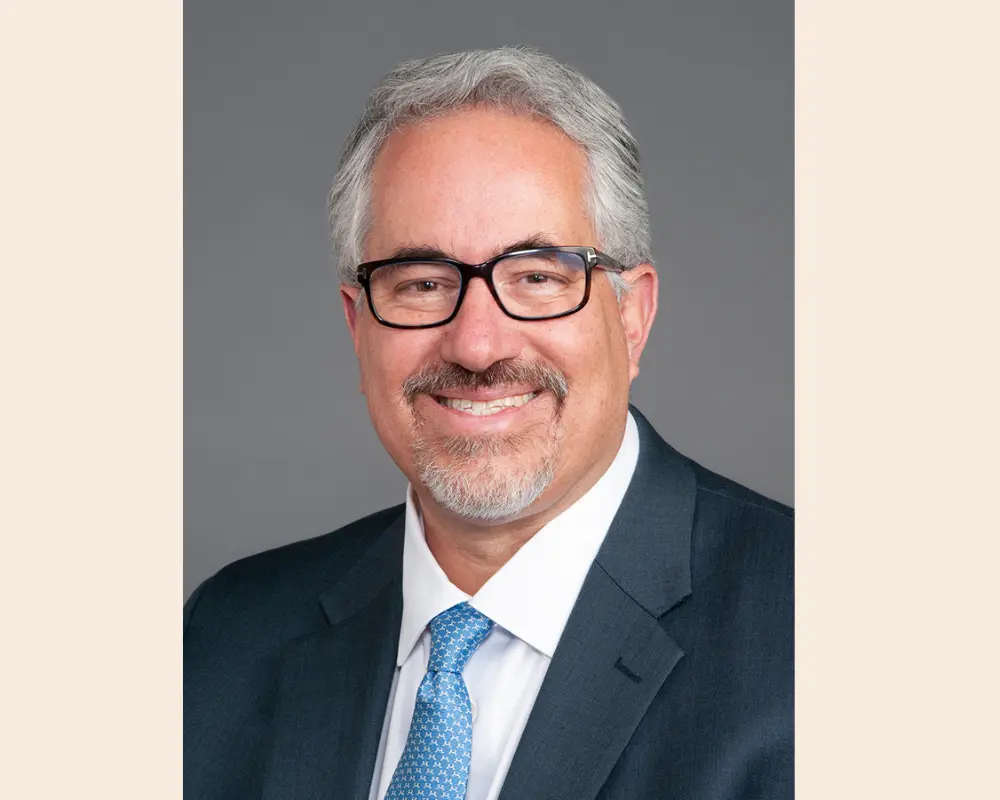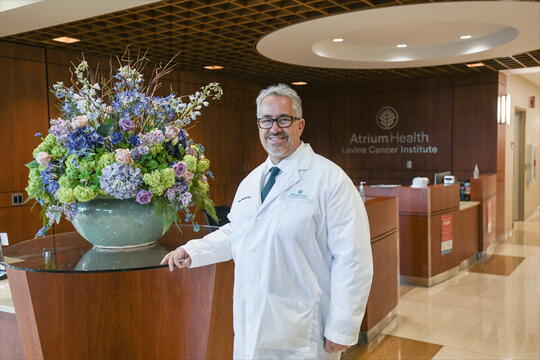
Congratulations to Dr. Mesa, a 2024 College of Liberal Arts & Sciences Distinguished Alumni Award Recipient!
In April 1986, a nuclear reactor exploded at the Chernobyl Power Plant in the Soviet Union. The worst nuclear disaster in history shaped the trajectory of nuclear power safety worldwide, while also shaping the career trajectory of then-18-year-old Ruben Mesa, a college freshman studying nuclear engineering 5,000 miles away from the blast site at the University of Illinois Urbana-Champaign.
Mesa, a 1991 graduate in Nuclear Engineering and Physiology and current president and executive director of cancer programs at Atrium Health Levine Cancer Institute and vice dean for cancer programs at Wake Forest University School of Medicine, came to the university with aspirations of conducting fusion research. But the Chernobyl disaster’s impact on the nuclear industry forced Mesa to pivot, and he quickly became enamored with a radiobiology course offered through the College of Liberal Arts & Sciences.
“Radiobiology opened my eyes to a broader ability to see things,” Mesa said. After conferring with academic advisors and learning about the dual degree program in engineering and LAS, he decided to enroll.
After graduation, Mesa’s next stop was the Mayo Clinic College of Medicine and Science in Rochester, Minn. to pursue radiation oncology, in what he considered a “logical evolution.” But he quickly found enjoyment in the patient care aspect of hematology and oncology, prompting another career pivot.
“People often think that studying cancer is about death,” Mesa said. “But cancer research is motivated by life. Cancer steals from patients and their loved ones, and it is our job to change that. It may seem like a depressing line of work, but I get to see people at their very best as they’re battling a difficult disease. So it is not depressing - it is actually very inspiring.”
As a hematologist-oncologist who has led or co-led the development of several drugs that treat chronic leukemias, Mesa feels humbled to be part of his patients’ families in their cancer journeys, calling it a “tremendous honor” that encompasses a certain level of patient-physician intimacy.
Mesa is also an activist intent on tackling health disparities in cancer care.

“It’s about access to care,” he said. “That begins with addressing the behaviors and risks that can lead to an increased risk of cancer – lack of access to healthy foods, HPV vaccination, tobacco cessation, screening and prevention, and early detection.”
Patients often pursue cancer care too late, and time can be the difference between a disease that is curable and one that is fatal, Mesa said. Factors that may delay cancer screening and diagnosis include race, geography, socioeconomic status, and general access to healthcare.
Prior to joining Atrium Health and Wake Forest University in 2023, he was Executive Director of the Mays Cancer Center at the University of Texas Health Science Center at San Antonio where he led cancer-related patient care, research, and drug discovery programs. In 2022, he testified before the House Committee on Energy and Commerce to expand diversity in clinical trials, requiring subject pools to be more reflective of the general population.
“We need to know if our current treatments are safe and effective for everyone,” Mesa said. “Diversity is a crucial piece of the healthcare puzzle - it impacts every stage.”
Clinical trials are close to Mesa’s heart – he’s served as principal investigator or co-investigator on more than 100.
“Clinical trials are a fundamental cornerstone of how we make progress,” he said. “The goal of every trial, regardless of outcome, is to learn something. If a trial is not successful, why was that? Was the drug not active? Was the dose incorrect? Did we hit a specific target of vulnerability?"
Trials should always be structured with a win-win approach, he explained: even if the desired outcome isn’t achieved, there should be clear takeaways pointing to the next step.
“Sometimes it is more important to publicize trials with negative results than trials with positive results,” Mesa said. “We need to share what was learned so our colleagues can build on that knowledge and apply something new. That’s progress.”
Charged with leading a team of over 4,000 researchers and healthcare professionals at Wake Forest, Mesa knows a thing or two about the power of collaboration in research.
“We are trying to make everything better every day,” he said. “Defeating cancer is a team sport, and progress requires an entire range of disciplines, skills, experiences, and expertise.”
Likening the research process to film credits at the end of a movie, Mesa emphasized the need for a good research question to unite stakeholders in large-scale collaborations.
“Research is the process of asking new questions, trying new things, and sharing findings with others,” he said. “But that process is slow and complicated; you have to be patient and willing to fail. I was involved with thirty clinical trials before I had one with positive results; sticking with it is key.”
In other words: you must be willing to pivot.
While Mesa’s career has taken him around the country to Arizona, Minnesota, Texas, and now North Carolina, he still considers Illinois the place that started it all.
“I am so happy that I went to a big, robust, thriving, interesting place like Illinois, where I was able to meet a bunch of people doing big things who were excited about their own trajectories,” Mesa said. “To be close to home while receiving a world-class education that was recognized anywhere for its excellence in science – it provided the whole 360 experience.”